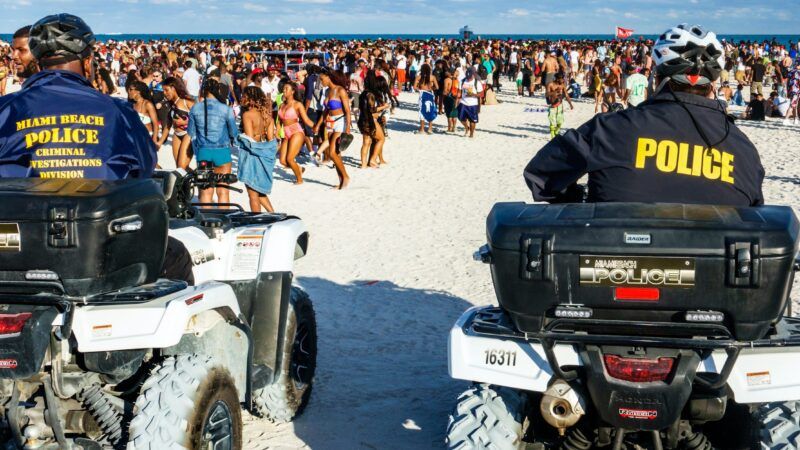Spring Break in Miami Brings a 'State of Emergency'
Curfews and alcohol rollbacks meant to mitigate danger actually hurt local businesses.

Miami Beach's curfew and alcohol rollback ended on Monday, March 28, concluding the island city's third consecutive year of spring break restrictions. Local businesses that lost revenue due to the heavy-handed policy are left wondering if the city will punish them again next year.
Well known for its luxury beach resorts, restaurants, and nightlife, Miami Beach has always been a hot spot for spring breakers. A fair amount of noise and altercation often result when thousands of tourists, college students, and locals are crammed into a few blocks of beach. Over the last three years, the local government's response to spring break rowdiness has been the same: impose curfews, restrict traffic, and roll back alcohol sales.
In response to "the excessively large and unruly spring break crowds," Miami Beach Mayor Dan Gelber implemented a state of emergency on March 23, calling for an evening curfew from Thursday, March 24 through Monday, March 28 between 11:59 p.m. and 6 a.m. During those hours, no businesses on a 10-block stretch of Ocean Drive and the Art Deco District (except hotels) could provide takeout or pickup services, though delivery was permitted. Restrictions on traffic and parking garage use were put in place, and the order also halted alcohol sales after 6 p.m.
While these measures were meant to "mitigate dangerous and illegal conduct," they largely hurt local shops, restaurants, and nightclubs (most of which were significantly impacted by Gelber's COVID-19 shutdowns). These businesses rely on tourist traffic for revenue, but most tourists will just flock somewhere outside of the curfew area to get their dose of nightlife. One wine bank owner estimated that he would lose over $10,000 a day due to the curfew and alcohol rollback, while high-end restaurant Papi Steak and Treehouse nightclub filed lawsuits against the city. Some local businesses argue that the measures are shutting down businesses that are not near—or provoking—any disorderly conduct while letting other businesses stay open.
"The main issue is on Ocean Drive and Collins," Gulf Liquors owner Jorge Zubigaray told Miami's WPLG. His business is located on the west side of the island, which is far from spring break hotspots but still under the curfew. "There's no chaos in front of my store. The rowdiness is on Ocean Drive, and they get to stay open until midnight, but I got to shut down at 6 p.m."
Businesses aren't the only ones getting the short end of the stick. Tourists are barred from experiencing Miami Beach's famous nightlife—whether they want to go to a club, restaurant, café, or lounge. Locals who are acquainted with the city can neither order alcohol with their dinner nor drive down certain streets in the evening hours. Since the Miami Beach Police Department began spring break enforcement on February 18, 636 people have been arrested, 508 of whom are locals.
State Rep. Michael Grieco (D–Miami Beach) tweeted:
The City of Miami Beach's fake-hustle "Spring Break" midnight curfew is an embarrassing government overreach. These types of measures are reserved for natural disasters, not neglect and poor/lack of planning. Law-abiding businesses and residents are being unfairly punished.
— Michael Grieco (@Mike_Grieco) March 22, 2022
Earlier this month, a circuit judge blocked the city from enforcing its original spring break rollback plan, which would have banned alcohol sales after 2 a.m. The city tried to enforce the same plan last spring, and that same circuit judge similarly ruled that the rollback was unlawful and in violation of zoning rules. After that 2021 ruling, Gelber announced plans to rezone the entertainment district into a "cultural district" to prevent the city from resembling "a beachfront Bourbon Street." Talk of overhauling the area to replace the "play, play, play area" with a "live, work, play area" brought fears of businesses being moved out or shut down, but some locals still think rezoning is a better option than setting curfews.
After a quieter few days, the city won't be implementing a curfew this weekend. Gelber apologized to business owners who lost revenue due to the state-of-emergency orders, but said, "I just don't think we had any other option."
It's predictable that crime and disturbances will arise when thousands of vacationers, locals, and college students are crammed on a small island, and lots of big cities deal with similar problems without declaring local states of emergency. Gelber's excessive pandemic lockdown of Miami Beach—which devastated local businesses and tourism—made the local government too comfortable with closing off the island whenever there is a problem.


Show Comments (20)